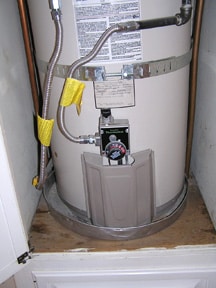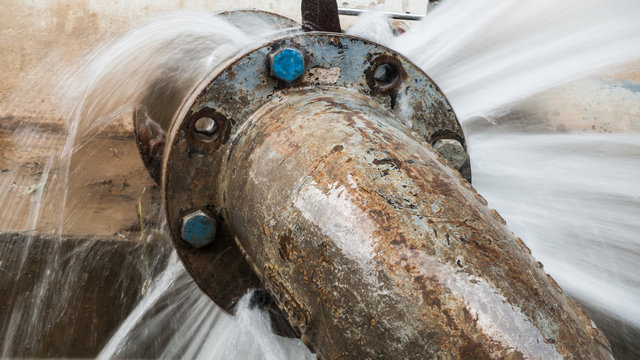The 5 Continuous Water Leak Sources
The 5 Continuous Water Leak Sources
Blog Article
Nearly everybody has his or her own conception involving Common Causes of Water Leaks in the Home.

"Be cautious of little costs. A little leak will sink a great ship." - Benjamin Franklin.
He couldn't have actually been extra appropriate due to the fact that water leaks in our homes result in a waste of sources, raising our water costs. This increase could appear negligible at first, it can lead to substantial costs that can damage your bank. Aside from a boost in costs, water leaks additionally cause undesirable organic development, structural damage, and also even electric threats.
Determining if you have a water leakage isn't constantly easy as a result of being unable to see the majority of the pipework in your house. If you have had an increase in your water bills lately, noticed water stains on ceilings as well as walls, scented poor smell, etc. You might want to think about requesting plumbing solutions to get it checked out.
There are numerous sources of water leaks, and we have actually put together the common reasons below. Examine to see if you have had relevant problems in your house just recently.
Weakened pipe joints
Pipe joints are the parts of our plumbing system where the pipes link. They are the weakest point of our plumbing system. Because of this, they are much more at risk to degeneration. It is essential to keep in mind that even though pipes are made to hold up against pressure as well as last for some time, they weren't developed to last permanently; consequently, they would degrade with time. This degeneration can lead to cracks in plumbing systems. A typical indicator of harmed pipe joints is extreme noise from taps.
High water pressure
You noticed your house water pressure is more than typical but after that, why should you care? It's out of your control.
It would certainly be best if you cared because your typical water stress ought to be 60 Psi (per square inch) and also although your home's plumbing system is developed to endure 80 Psi. A rise in water stress can put a stress on your house pipes as well as bring about cracks, or even worse, ruptured pipes. Get in touch with a specialist about regulating it if you ever before see that your home water pressure is higher than usual.
Rust
As your pipework ages, it obtains weak and also more susceptible to rust after the regular flow of water via them, which can gnaw at pipelines and also create fractures. A noticeable sign of deterioration in your house plumbing system is discoloration as well as although this may be hard to detect because of many pipelines hidden away. Once they are old to ensure a sound plumbing system, we encourage doing a frequent check-up every few years as well as alter pipelines
Obstructed drains
Food particles, dirt, and also grease can cause blocked drains as well as obstruct the flow of water in and out of your sink. Increased pressure within the gutters can trigger an overflow and also end up cracking or rupturing pipelines if undealt with. To stay clear of blocked drains in your home, we recommend you to prevent putting fragments away and also regular cleaning of sinks.
Broken seals
Another source of water leaks in residences is broken seals of house appliances that use water, e.g., a dish washer. When such home appliances are installed, seals are installed around water adapters for very easy flow of water through the maker. Hence, a damaged seal can create leak of water when in use.
With little or no expertise of plumbing, understanding your home's plumbing system enough to fix some of these problems (without effect) can be an inconvenience. Contact plumbing professionals in Pittsburgh, Providence, Rochester, and environ today, and they'll make those issues go away.
He could not have actually been extra appropriate since water leaks in our homes result in a waste of sources, boosting our water expenses. If you have had an increase in your water costs recently, discovered water stains on wall surfaces as well as ceilings, scented lousy smell, and so on. A boost in water pressure can put a stress on your home pipes and also lead to cracks, or worse, burst pipes. Another cause of water leaks in houses is damaged seals of house devices that utilize water, e.g., a dish washer. When such devices are mounted, seals are set up around water ports for simple passage of water through the machine.
5 TIPS IN DETECTING A WATER LEAK IN YOUR HOUSE
Water leaks can be hard to find in your home, yet they can be so common. We rely on water every day in our home, which is why a leak can cause big problems. By detecting them early, you can save money and further damage, getting the problem fixed as soon as possible. Here are 5 tips to help you detect a water leak in your home, so you can contact a plumber straight away and get the issue sorted.
Check your water meter
Many people underestimate the value of the water meter in their home. It can be one of the best ways to tell if you have a leak early on, so you can get on top of it before issues start arising. Start by turning off all the water in your home: taps, washing machine, dishwasher, etc. Now take a look at the meter – if it’s still changing with everything turned off, it’s likely you have a fast-flowing leak that you need to get on top of straight away. If nothing changes, then leave your meter for an hour or two and come back to it. Did it change in this time? It’s likely you have a slower leak, which isn’t as urgent but still handy to get fixed so it doesn’t become a bigger problem.
Keep an eye on your bill
Another good way to detect a leak in your home is by keeping an eye on your water bill. It helps if you have a past bill from the same period of time. You can compare like for like and determine whether your water usage has increased significantly. If it has, there may be a leak in your system that you haven’t picked up before. A professional plumber can check through all of your pipes and determine where it is coming from.
Look for damage
If you have a leak inside your home, you will notice damage over time. Take a look at your showers and bathtubs and note whether any of the tiles surrounding the area seem to be discoloured or damaged in any way. There may be water stains, mould or peeling material that has resulted from a build up of moisture over time. Make sure you take a look under sinks at the back of cupboards that don’t get accessed regularly. This is where damage can go unnoticed and build up over periods of time.

As a person who reads about How to Find and Prevent Water Leaks in Your Home, I imagined sharing that piece was a good thing. Are you aware of someone else who is fascinated by Where to Find Water Leaks? Why not promote it. Thank you so much for taking the time to read it.
Your search ends; experts here. Report this page